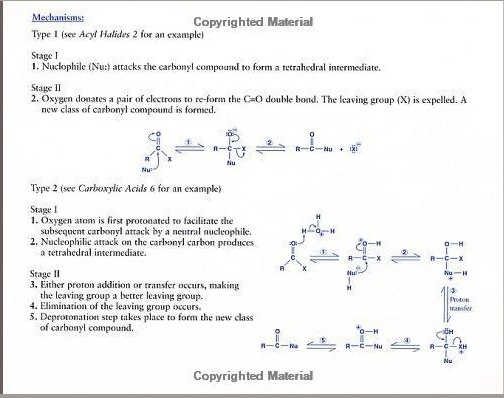OrgoCards: Organic Chemistry Review; by Wang, Razani, Lee, Wu, and Berkowitz
The content of the OrgoCards is in agreement with organic chemistry textbooks. Flash cards encourage connecting the start and end together without a middle. The middle is the explanation of why the reactions take place. My question is, "How will a flash card improve your organic chemistry thinking?"
What don't I like about flash cards? I think they cater to a concept of "there is an easier way to learn organic chemistry." A mathematical equivalent would be 674 x 328 = 221,072. Now, lets expand this to five additional examples. All would contain the correct answers. If you memorized these math facts, you could give the correct answers.
Lets look to see what you have accomplished pedagogically. Flash cards associate two facts, the multipliers with the products. Now that you have memorized these math facts, are you now able to give the answer to 677 x 432 = ?. If the six multiplication examples you memorized encompassed 99% of multiplication problems, then it wouldn't matter that there could exist problems that you couldn't solve, because they would be rare. For multiplication, that is absurd. The way to learn multiplication is to learn how to PERFORM the steps in multiplying numbers together. You should not and could not memorize enough math facts to cover all of the examples in an effort to avoid the process of solving the problem using long-hand.
Organic chemistry is like multiplication. Flash cards encourage connecting the start and end together without a middle. The middle is the explanation of why the reactions take place. If you look at the examples in "The Language of Organic Chemistry, A Guide to Organic Chemistry Mechanisms"®, the emphasis is on the process in the middle. It is like learning multi-column multiplication or long division. However, it is broken down and presented in a way that you can master.
This is a screen shot from an excerpt of an OrgoCard on Amazon.com®. My question is, "How will this format improve your organic chemistry thinking?" It is the SAME MATERIAL, the same content as a conventional textbook. If you didn't know it or remember it, why should a flash card be better? Also, there are free organic chemistry flash card sites, like the one at OSU.

Lets look to see what you have accomplished pedagogically. Flash cards associate two facts, the multipliers with the products. Now that you have memorized these math facts, are you now able to give the answer to 677 x 432 = ?. If the six multiplication examples you memorized encompassed 99% of multiplication problems, then it wouldn't matter that there could exist problems that you couldn't solve, because they would be rare. For multiplication, that is absurd. The way to learn multiplication is to learn how to PERFORM the steps in multiplying numbers together. You should not and could not memorize enough math facts to cover all of the examples in an effort to avoid the process of solving the problem using long-hand.
Organic chemistry is like multiplication. Flash cards encourage connecting the start and end together without a middle. The middle is the explanation of why the reactions take place. If you look at the examples in "The Language of Organic Chemistry, A Guide to Organic Chemistry Mechanisms"®, the emphasis is on the process in the middle. It is like learning multi-column multiplication or long division. However, it is broken down and presented in a way that you can master.
This is a screen shot from an excerpt of an OrgoCard on Amazon.com®. My question is, "How will this format improve your organic chemistry thinking?" It is the SAME MATERIAL, the same content as a conventional textbook. If you didn't know it or remember it, why should a flash card be better? Also, there are free organic chemistry flash card sites, like the one at OSU.
